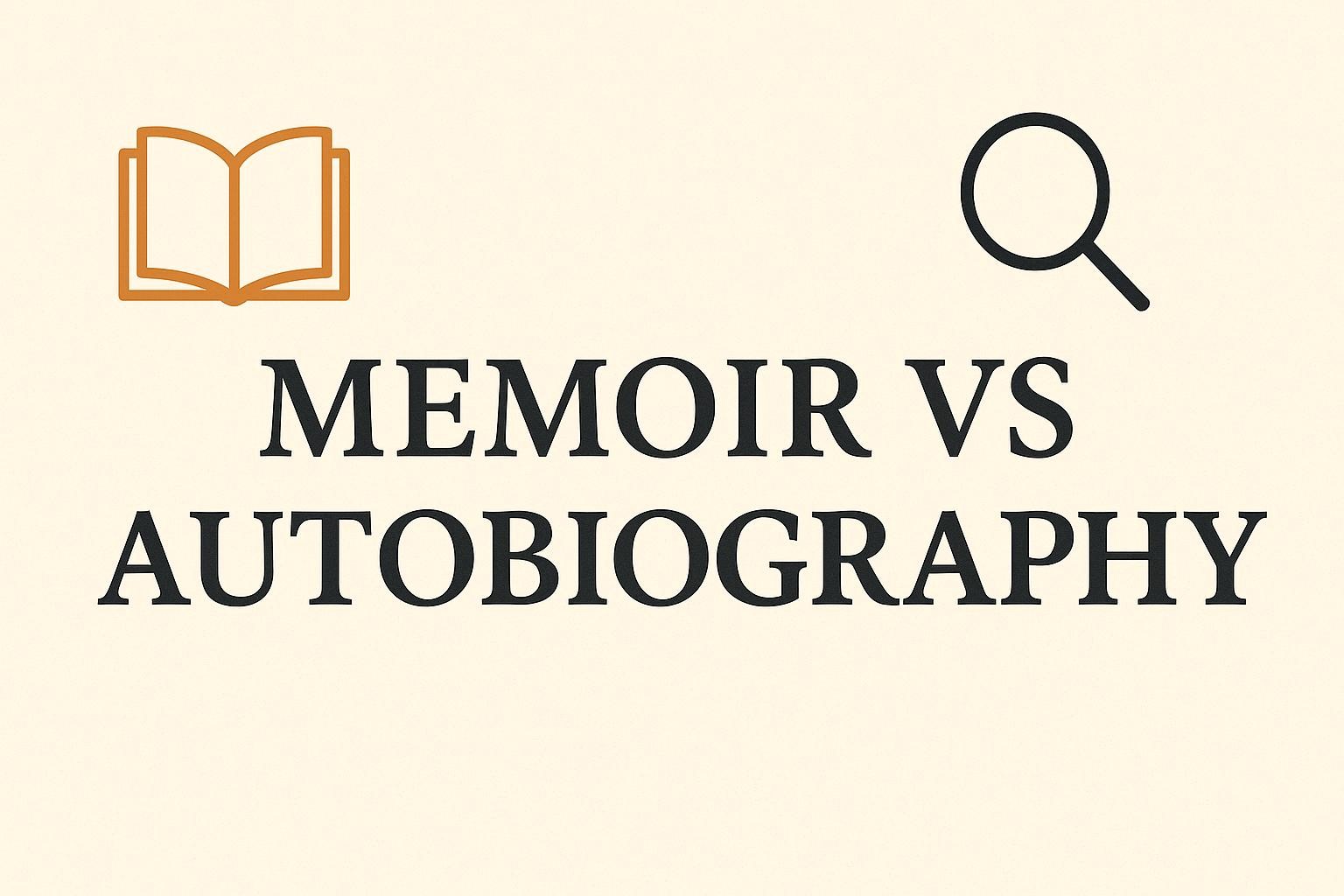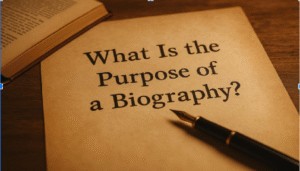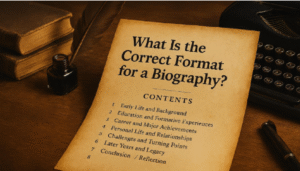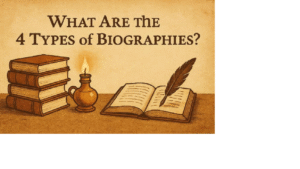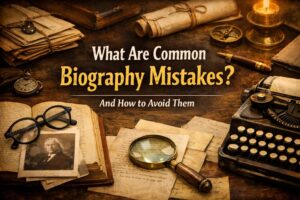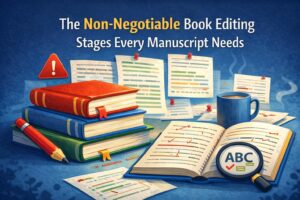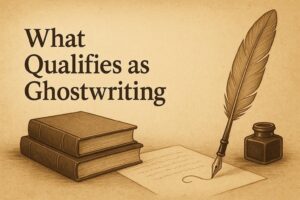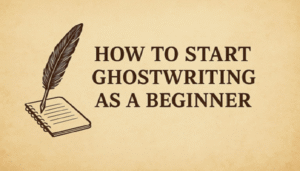Confused between writing a memoir or an autobiography? Learn the real differences between the two, discover famous examples, and find out which form fits your life story best.
Introduction
Somewhere between the memories and the milestones, between the quiet days and the stormy years, you decide: It’s time to write my story.
So you sit down, pen trembling just slightly, or fingers hovering over the keys. And then, a question sneaks in.
“Wait… am I writing a memoir or an autobiography?”
You’re not alone. It’s one of the most common points of confusion, and one of the most important decisions a life-story writer can make. Because here’s the thing: the way you tell your story shapes how it’s received. It shapes what you share, what you keep, what you elevate, and what you allow to breathe in the background.
Understanding the difference between a memoir vs autobiography isn’t about getting academic definitions right. It’s about choosing the frame that does your story justice.
This guide will help you see the difference clearly, choose the right path for your purpose, and start writing with confidence.
Definitions: One Life, Two Lenses
You’re ready to tell your story, but first, you need to know what kind of story you’re telling.
Memoir and autobiography often get lumped together, but they’re not interchangeable. They may both be drawn from memory, but the way they move through a life is entirely different.
Let’s break them down.
Autobiography: The Full Record
An autobiography is the whole sweep of a life. From childhood scars to career peaks, it’s your timeline, from start to (near) finish.
Structure & Scope
It follows a chronological path; a step-by-step unfolding of your life story. Think chapters titled “Early Years,” “Education,” “Career,” “Marriage,” and so on.
Purpose
It’s about legacy. Accuracy. Leaving a trail.
Autobiographies are often written by public figures or those wanting to preserve their life as a kind of historical document.
Tone
More formal. Less emotionally raw.
You’re documenting your life for posterity, not necessarily pouring your heart out.
Support
If you’re writing an autobiography and struggling with structure or fact-checking, some memoir writing services also assist with autobiographical projects; helping shape complex timelines into clear, engaging narratives.
Memoir: A Focused Lens on Meaning
A memoir doesn’t aim to cover everything. It zooms in on something that changed you.
Theme Over Timeline
Memoirs are thematic, not chronological. You might be writing about your decade in addiction recovery. Or your journey through parenthood. Or a single summer that shaped your entire worldview.
Memoir is less about what happened and more about why it mattered.
Voice & Style
Here, you get intimate. You write as you speak; raw, reflective, real.
You can jump around in time, loop back, break the fourth wall. You have freedom.
Emotional Truth
While autobiographies chase facts, memoirs chase feelings. Memory is allowed to be messy here. And memoir writers know this: the power of a good memoir isn’t in perfect accuracy. It’s in resonance. It’s when a stranger underlines your sentence and says, “Yes. That was me too.”
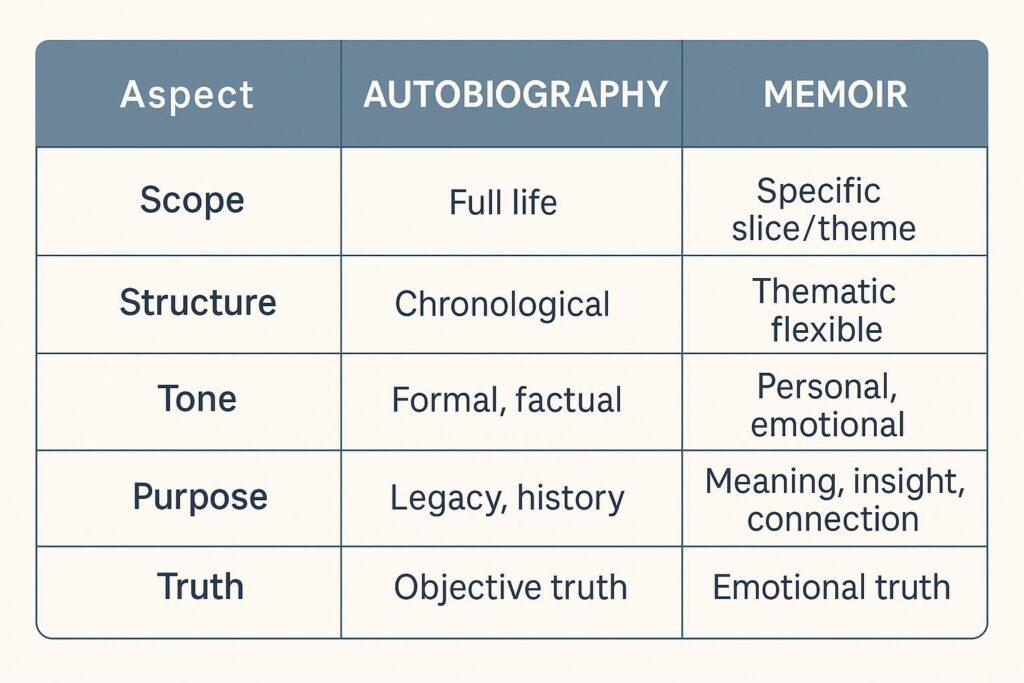
Key Differences Between Memoir and Autobiography
Alright. So now you know what a memoir is, and what an autobiography is.
But how do they actually differ on the page?
Let’s get into the heart of it. This is where these two forms part ways, and why that matters for you.
1. Scope: Wide Angle vs Close-Up
This is the biggest, boldest difference.
An autobiography is the full life. It starts near the beginning, often with birth or early childhood, and works its way forward. It’s comprehensive. You’re telling your entire story, covering every major chapter: family, education, relationships, career, challenges, achievements, and growth.
A memoir picks one thread and follows it to the end. It’s about a season, not a saga. Memoir might cover five years, or one relationship, or one personal transformation.
If autobiography is the entire photo album, memoir is one unforgettable photograph.
2. Purpose: Record vs Reflection
Autobiographies aim to record a life.
They are historical in nature, a document of your lived experience, often with the intent to preserve it for future generations, researchers, or curious readers. Autobiography writers often think in terms of legacy, milestones, and public contribution.
Memoirs aim to reflect on a life.
They look inward. They’re written to make sense of something like trauma, change, survival or redemption. Memoir writers often say, “I wrote this to understand what happened to me.” It’s not about preserving a timeline. It’s about sharing a message.
3. Structure: Chronological vs Thematic
Autobiographies tend to be chronological.
There’s a beginning, middle, and end. It’s neat. It’s structured. There’s a timeline, a through-line, and usually, a sense of progression.
Memoirs are thematic or fragmented.
They skip around. They jump timelines. They follow emotions rather than dates. Memoirs often use creative narrative techniques like flashbacks, letters or braided narratives. You get to decide how memory is told.
4. Tone: Objective vs Intimate
Autobiography writers often adopt a measured, informative tone.
There may be moments of emotion, but the overall voice is observational. You’re speaking to a reader who may not know you, and you want to earn their trust through clarity and coherence.
Memoir, on the other hand, is intensely personal.
It reads like a diary cracked open. The tone is raw, reflective, sometimes brutally honest. You don’t just tell readers what happened. You let them feel it.
You say things in a memoir you might not say out loud. And that’s the point.
5. Audience: Legacy vs Connection
Autobiographies are often written for legacy, posterity or documentation. Readers may be students, historians, family members or people who want to understand the arc of your life, especially if you’ve lived publicly or impacted the world around you.
Memoirs are written for connection. Readers are often strangers, looking for truth, resonance or healing. They’re not reading for your resume. They’re reading for your revelation.
6. Truth: Documented vs Remembered
Autobiographies strive for accuracy. You might check dates, interview family, look through journals or official records. Many autobiography writers even work with ghostwriters or editors to ensure the facts are sound and the structure flows.
Memoirs, by contrast, accept the fallibility of memory. They say, “This is how I remember it. This is my truth, even if some details are fuzzy.” Memoir readers are okay with that, as long as you’re emotionally honest.
7. Examples: What It Looks Like
Want to see it in action?
Famous Autobiographies
- Long Walk to Freedom by Nelson Mandela
- The Story of My Life by Helen Keller
- The Autobiography of Malcolm X
Famous Memoirs
- Educated by Tara Westover
- The Glass Castle by Jeannette Walls
- Becoming by Michelle Obama (yes, this one straddles both)
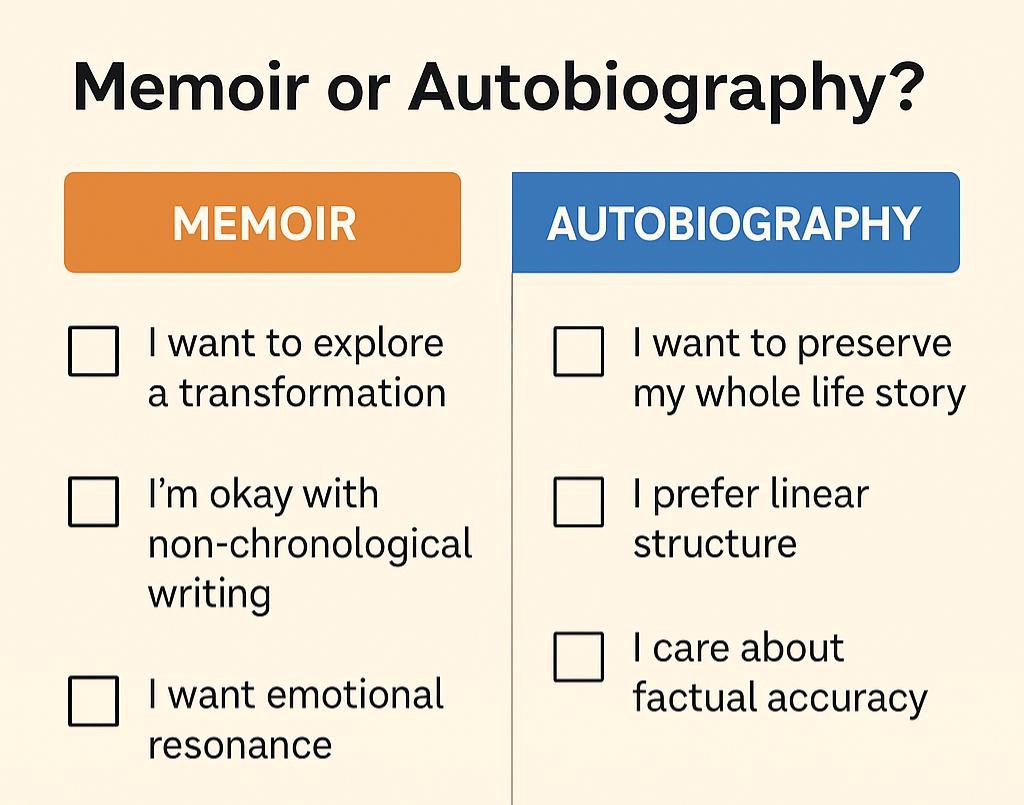
If you’re writing to preserve your life’s journey in full, autobiography might be your path.
If you’re writing to make sense of one meaningful part of it, memoir will likely serve you better.
If you need to hire a memoir writer, get in touch.
When to Choose Memoir vs Autobiography
So. You’ve got a story inside you.
But you’re still wondering which form will do it justice. Memoir or autobiography? Personal or panoramic? The truth is, one isn’t better than the other. It just depends on the kind of story you’re ready to tell.
Let’s figure that out.
Ask Yourself: What’s Driving You?
Start with purpose. Are you trying to reflect, or record? To dive into meaning, or to lay out facts?
If you’re writing because something changed you, moved you, broke you, or made you, memoir is your space. You don’t need to explain everything. You just need to illuminate something true. That one chapter of your life may be enough to speak volumes.
If you want to map your entire journey, highlight your growth, share your full arc from start to now, an autobiography may be the right choice. Especially if you’re thinking about legacy, or want to capture how all the pieces of your life fit together.
Consider What You Remember
This part matters more than most people admit.
If your memories are patchy, if you recall moments and emotions more vividly than dates and sequences, that leans naturally toward memoir. You have space to explore feeling over fact.
If you’ve kept journals, letters, photographs or have a strong memory for detail, you might feel more comfortable writing a full autobiography. Just remember, you don’t need to remember everything. You need to remember enough to tell the truth of your life.
Think About Your Audience
Autobiographies tend to be read by people who want the full picture. Family. Students. Biographers. Historians. Readers who are interested in how a life unfolded across time.
Memoirs draw in readers looking for connection. They want to see themselves in your experience. They read to feel seen, not just informed.
So ask yourself: Do I want to be a guide through someone’s emotions, or a narrator through my own timeline?
What’s the Story That Won’t Let You Go?
This is maybe the most important question of all. Not what you could write, but what you need to.
What’s the story you keep circling back to when the room goes quiet? What’s the part of your life you still carry, still question, still feel in your bones?
That’s your beginning.
When you understand that, the memoir vs autobiography choice becomes clearer. It’s not about fitting your life into a category. It’s about choosing the frame that lets your story breathe.
Pros and Cons of Memoirs and Autobiographies
Every form of storytelling comes with its strengths and its struggles. Knowing these can save you time, frustration, and self-doubt. It can also help you choose which road is truly yours.
The Strengths of Memoirs
Memoirs thrive on intimacy. They pull the reader close and whisper, this is what it felt like to live through this. They resonate not because they are comprehensive, but because they are focused.
- Emotional depth: Memoirs dig beneath the surface. They don’t just explain events; they show how those events changed you.
- Flexible structure: You can write in fragments, loops, or straight lines. Whatever best mirrors the way memory works for you.
- Connection with readers: Good memoirs feel like conversations. They leave space for readers to see themselves in your words.
The challenges: Memoirs can easily lose focus if you try to include too much. Many new memoir writers fall into the trap of trying to tell their whole story instead of staying true to one theme. Vulnerability can also feel frightening, but it’s usually where the magic lies.
The Strengths of Autobiographies
Autobiographies offer the satisfaction of completeness. They give readers the full arc, the entire picture of a life lived. They can feel weighty, historic, and enduring.
- Legacy and history: They preserve your story for family, future generations, and readers interested in the sweep of your life.
- Comprehensive detail: Dates, milestones, turning points, and achievements are all included.
- Structured narrative: Chronology makes it easier to follow and digest.
The challenges: An autobiography can feel overwhelming to write. It takes time, memory, and patience. Without emotional storytelling, it can read like a list of events. Some people choose to work with autobiography writing services to shape the content into something engaging and accessible.
Choosing Your Path
Memoir or autobiography? Emotional truth or complete record? Both have their value, and neither is lesser than the other. What matters is which one helps you tell the story that matters most.
Memoirs are about why it mattered.
Autobiographies are about what happened.
One draws power from intimacy. The other from scope. Both can leave a mark.
How to Write Each: Practical Tips
Knowing whether you’re writing a memoir or an autobiography is only the first step. The real challenge begins when you sit down to turn lived experience into words. Life is messy. Stories are slippery. And memory rarely plays by the rules.
That’s why you need practical guidance. Writing your life story isn’t just about remembering. It’s about shaping. It’s about choosing. It’s about turning raw experience into a narrative that can carry a reader from the first page to the last.
Let’s look at how to approach each form so you can start strong and keep moving.
Writing a Memoir
Memoir is intimate by nature. It asks you to open doors you might prefer to keep shut, then invite readers in. That’s scary, but it’s also where the power lies.
1. Choose a Theme
Memoirs work best when they are built around a clear theme. That might be resilience, grief, addiction, healing, love, or reinvention. Your theme is the compass that tells you what belongs in the story and what doesn’t. If it doesn’t serve the theme, it doesn’t belong.
2. Select Key Events
Don’t try to include everything. Instead, pick the scenes and moments that best illustrate your theme. Ask yourself: which memories still tug at me? Which ones hold the lesson I want to share? Which ones changed me? Those are the memories that deserve space on the page.
3. Write With Emotional Honesty
A memoir doesn’t need perfect accuracy, but it does need emotional truth. Be willing to admit uncertainty. Be willing to be vulnerable. Readers connect with imperfection more than with polish.
4. Play With Structure
Memoir gives you freedom. You don’t have to write in a straight line. You can use flashbacks, fragments, or even experiment with formats like letters, diary entries, or braided narratives. Memory is not linear, so your story doesn’t have to be either.
5. Focus on Connection
Remember: your reader isn’t just interested in you. They are interested in what your story awakens in them. Write in a way that leaves space for them to whisper, “me too.”
Writing an Autobiography
Autobiography is a different beast. It’s less about emotion and more about the full picture. It requires patience, structure, and a commitment to accuracy. It also requires faith that a reader will follow you through the decades of your life, as long as you make it worth their while.
1. Start With an Outline
Because an autobiography usually covers your entire life, an outline is essential. Begin with childhood, then move through your education, relationships, career, challenges, and achievements. Outlining gives you a roadmap so you don’t lose yourself in the sheer volume of material.
2. Include Milestones and Turning Points
Readers expect to see the major events that shaped you. Include not just the happy moments but also the struggles, failures, and lessons. These are the points that make your life relatable and real.
3. Balance Fact and Storytelling
Dates and accuracy matter here. Dig into journals, letters, photographs, or even interview family members to fill in the gaps. At the same time, don’t let your autobiography turn into a dry timeline. Weave stories into the facts so readers feel engaged.
4. Keep the Reader in Mind
Remember that not every detail of your life will be fascinating to others. Choose the stories that illustrate growth, conflict, or transformation. Filter out the ordinary so the extraordinary shines brighter.
5. Get Support If You Need It
Autobiographies can feel overwhelming. Many people turn to ghostwriters or editors to help them shape their stories. Experienced autobiography writers for hire know how to balance fact with flow, ensuring the story reads smoothly while staying true to your voice.
The Common Thread
Whether you choose memoir or autobiography, the same truth applies: your story matters. The way you tell it is up to you. Memoirs thrive on intimacy and emotional honesty. Autobiographies thrive on structure and scope. Both can change a reader’s life.
So start. Write the first memory that won’t let you go. Jot down the outline of your earliest years. Choose the entry point that feels right.
Because the hardest part of writing your life story is not deciding between memoir and autobiography. It’s deciding to begin.
Frequently Asked Questions
Memoir vs autobiography, which is right for me?
The answer depends on scope, purpose, and audience. Once you’re clear on those, the rest will fall into place.
Can a book be both a memoir and an autobiography?
Sometimes, yes. Some books straddle the line between the two. For example, a memoir might contain broad life details, or an autobiography might focus heavily on a particular theme. Still, most books lean clearly toward one category. If you feel torn, think about the core intent of your story. That usually gives you your answer.
Does a memoir have to be completely true?
Yes, memoirs are nonfiction. That said, memory is imperfect, and readers understand that. You don’t need to get every date right, but you do need to tell the truth of your experience. Emotional honesty is more important than perfect detail.
Do I need to cover my entire life in an autobiography?
Generally, yes. Autobiographies are meant to be comprehensive, usually beginning with early life and moving forward to the present or a defined stopping point. However, you can choose to leave out less significant details. What matters is giving readers a sense of the full arc of your journey.
How do I decide what events to include in a memoir?
Think about your theme. Every event you include should shine a light on the central message of your book. If it doesn’t serve that message, it doesn’t belong. Memoirs gain their power from focus.
Can non-famous people write autobiographies?
Absolutely. You don’t need to be a celebrity or a world leader to share your story. Autobiographies are valuable for family history, for cultural preservation, or simply for leaving a legacy. Readers will care if you write with honesty and intention.
What are common mistakes to avoid?
For memoirs, the biggest mistake is trying to cover everything. Without focus, you risk overwhelming the reader. For autobiographies, the danger is writing something too dry. Facts matter, but so does storytelling. You want your readers to keep turning the page.
What about privacy or legal issues?
If you’re writing about real people, you may want to change names or identifying details. You can also combine certain figures into composite characters in a memoir. For sensitive material, it’s worth consulting legal advice, especially if your story involves controversial events.
Conclusion
At the end of the day, whether you choose memoir or autobiography, what matters is that your story is told. Both forms have their place. One captures the sweep of a life in full, the other digs into the raw truth of a moment that changed everything.
The choice between memoir vs autobiography isn’t about rules. It’s about asking yourself what you most need to share. Do you want to preserve your entire journey for future generations? Or do you want to let readers step into the heart of a single defining chapter?
Whichever path you take, write with courage. Write with clarity. Write as though your story will land in the hands of someone who desperately needs to hear it.
Because it will. And the only way that happens is if you start today.

